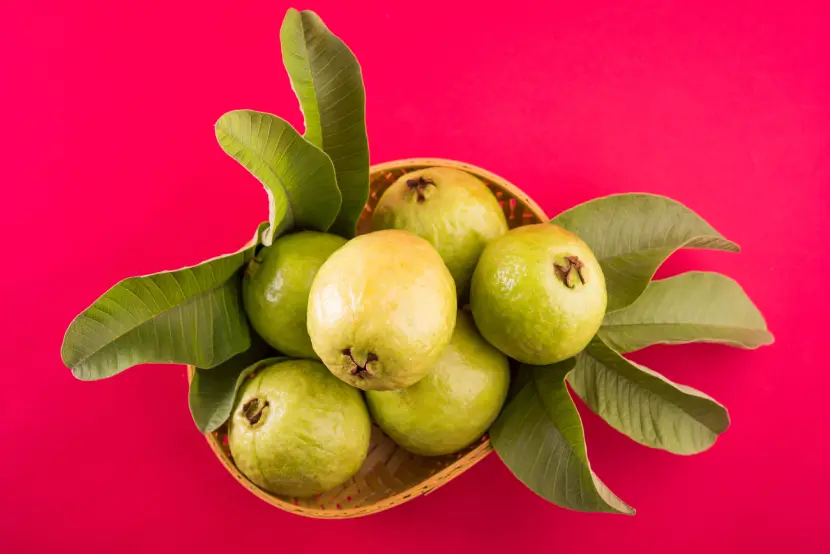Introduction to Apple Guava
What Makes Apple Guava Unique
Among the vast array of tropical fruits gaining attention in the health and wellness community, apple guava stands out for its exceptional nutritional profile and versatile health applications. This remarkable fruit captivates health enthusiasts with its perfect balance of sweet and tart flavors, while offering an impressive array of health-promoting compounds. As a nutrition expert who has studied various superfoods, I’ve observed a growing interest in this fruit among health-conscious consumers who are seeking natural ways to enhance their wellbeing.
Historical and Cultural Significance
While the rich cultural heritage of this fruit spans centuries across tropical regions, our focus today centers on its remarkable applications in modern health practices. Contemporary scientific research has validated many traditional uses, establishing its significant role in today’s health-conscious society. The growing body of evidence supporting its health benefits has led to increased recognition in Western markets, where consumers are increasingly incorporating this nutritious fruit into their daily routines.

Nutritional Profile of Apple Guava
Essential Vitamins and Minerals
When you examine the nutritional composition of apple guava, you’ll find an impressive array of essential nutrients. This fruit is particularly notable for its high vitamin C content, containing up to four times more vitamin C than oranges per serving. Additionally, it provides significant amounts of:
- Vitamin A for eye health and immune function
- Potassium for maintaining healthy blood pressure
- Dietary fiber for digestive health
- Calcium for bone health
- Iron for blood health
Antioxidant Properties
The antioxidant profile of apple guava deserves special attention. Research has shown that this fruit contains various bioactive compounds, including:
- Polyphenols
- Flavonoids
- Carotenoids These compounds work synergistically to protect your cells from oxidative stress and inflammation.
Health Benefits and Scientific Research
Digestive Health Benefits
Clinical studies have consistently demonstrated the positive impact of this fruit on digestive health. Its unique combination of soluble and insoluble fiber, along with natural digestive enzymes, creates a powerful support system for your gastrointestinal tract. Regular consumption may help improve nutrient absorption, support healthy gut bacteria populations, and promote regular bowel movements. Many of my clients have reported noticeable improvements in their digestive comfort after incorporating this fruit into their daily diet.
Immune System Support
Your immune system stands to benefit significantly from this nutrient-rich fruit’s powerful combination of vitamin C and antioxidants. Research indicates that regular consumption may enhance natural immune responses and support white blood cell function. The synergistic effect of its various compounds provides comprehensive immune support, particularly beneficial during seasonal changes or periods of increased stress.
Heart Health Advantages
Cardiovascular research suggests promising benefits for heart health through multiple pathways. The fruit’s unique combination of potassium, fiber, and antioxidants supports healthy blood pressure levels and helps maintain optimal cholesterol balance. The presence of heart-healthy compounds may contribute to improved blood vessel function and overall cardiovascular wellness.
Understanding the Apple Guava Plant
Growth and Cultivation
While our primary focus remains on health benefits, understanding optimal growing conditions helps you identify high-quality fruit for maximum nutritional benefit. The most nutrient-dense fruits come from plants grown in ideal conditions, with proper sunlight exposure and soil nutrition. This knowledge empowers you to make informed choices when selecting fresh fruit for consumption, ensuring you receive the maximum health benefits from each serving.
Forms and Preparations
Fresh Apple Guava Consumption
When selecting fresh apple guava, look for fruits with a subtle, sweet aroma and slight softness to touch. Fresh consumption offers the highest nutritional value, as heat processing can diminish certain heat-sensitive nutrients. The entire fruit, including the peel, is edible and particularly rich in beneficial compounds. Some consumers prefer to remove the seeds, though they are also safe to consume and contain additional nutrients.
Supplements and Extracts
Beyond fresh consumption, various concentrated forms have emerged in the health supplement market. These preparations aim to provide the fruit’s benefits in convenient, shelf-stable forms. However, it’s important to note that while supplements can be beneficial, they may not replicate all the synergistic effects found in the whole fruit. When choosing supplements, look for products that maintain the natural compound ratios found in fresh apple guava.
Recommended Daily Intake
Dosage Guidelines
Current research suggests that consuming 1-2 servings of fresh fruit daily can provide significant health benefits. A typical serving size consists of one medium-sized fruit or approximately 100 grams. If you’re using supplements, following the manufacturer’s recommended dosage is essential, as concentrations can vary significantly between products.
Best Times for Consumption
Timing your consumption can optimize the benefits you receive. Many nutrition experts recommend enjoying this fruit as part of your morning routine, as its high fiber content can help stabilize blood sugar levels throughout the day. However, you can also incorporate it into afternoon snacks or pre-workout nutrition plans.
Target Demographics
Age Groups
While beneficial for all age groups, apple guava consumption may be particularly valuable for:
Young adults seeking natural energy and immune support Middle-aged individuals focusing on heart health maintenance Older adults interested in antioxidant protection and digestive health Each age group may experience different benefits based on their specific health needs and concerns.
Health Conditions
Research indicates that this fruit may offer particular benefits for individuals managing:
- Blood sugar concerns
- Cardiovascular health
- Digestive issues
- Immune system challenges
However, as with any dietary change, consulting healthcare providers is essential, especially for those with existing health conditions or taking medications.
Market Analysis and Consumer Trends
Global Market Overview
The global market for apple guava products continues to expand, driven by increasing awareness of its health benefits. Market research indicates growing demand in both traditional and emerging markets, with particular interest in organic and sustainably sourced options. The apple guava plant cultivation has expanded to meet this rising demand while maintaining quality standards.
Consumer Preferences
Modern consumers show strong preferences for natural, minimally processed foods with clear health benefits. This trend aligns perfectly with the properties of fresh apple guava and its various preparations. Market data suggests that educated consumers are particularly interested in products that offer multiple health benefits while fitting easily into their daily routines.
Potential Side Effects and Precautions
Known Interactions
When considering apple guava consumption, it’s important to understand potential interactions with medications and existing health conditions. While generally safe for most individuals, those taking blood-thinning medications should exercise caution due to the fruit’s vitamin K content. Additionally, individuals with diabetes should monitor their intake as part of their overall carbohydrate management plan, though research suggests the fruit’s fiber content helps moderate blood sugar impact.
Risk Groups
Certain populations should take specific precautions when incorporating this fruit into their diet. Pregnant women should consult healthcare providers before significant consumption, though moderate intake is generally considered safe. Those with specific allergies or sensitivities should begin with small amounts to monitor their body’s response. While apple guava allergies are rare, they can occur, particularly in individuals with sensitivities to other tropical fruits.
Quality Considerations
What to Look For
Identifying high-quality fruit requires attention to several key factors. The best specimens should yield slightly to gentle pressure without being overly soft. When selecting apple guava products, whether fresh or processed, prioritize those from reputable sources that maintain rigorous quality control standards. The fruit’s aroma should be sweet and tropical, indicating optimal ripeness and nutrient content.
Storage Guidelines
Proper storage significantly impacts both nutritional value and safety. Store fresh fruit at room temperature if planning to consume within 2-3 days. For longer storage, refrigeration can extend freshness for up to a week, though this may slightly affect texture. Commercial products derived from the apple guava plant should be stored according to manufacturer guidelines to maintain potency and safety.

Scientific Research and Clinical Studies
Evidence-Based Benefits
Recent clinical studies have provided compelling evidence supporting the traditional uses of apple guava in health promotion. A comprehensive review published in the Journal of Nutrition examined the fruit’s impact on various health markers, demonstrating significant positive effects on cardiovascular health and blood sugar regulation. Multiple controlled trials have documented improvements in antioxidant status among regular consumers, with participants showing measurable increases in plasma antioxidant levels after eight weeks of consistent intake.
Research Limitations and Future Directions
While existing research provides strong support for many health claims, it’s important to acknowledge current limitations in the scientific literature. Most studies have focused on short-term outcomes, creating opportunities for extended longitudinal research. Additionally, while the apple guava plant has shown promising results in preliminary studies, larger-scale clinical trials are needed to fully understand its potential in specific health conditions. Future research directions may explore the fruit’s role in gut microbiome modulation and its potential synergistic effects when combined with other functional foods.
Incorporating Apple Guava Into Your Diet
Practical Usage Tips
Integrating this nutritious fruit into your daily diet can be both enjoyable and beneficial. Beyond fresh consumption, consider incorporating it into smoothies, breakfast bowls, or healthy desserts. The fruit’s versatility allows for various preparation methods while maintaining its nutritional benefits. For optimal results, combine consumption with a balanced diet and healthy lifestyle practices.
Recipe Suggestions
Creative culinary applications can make regular consumption more enjoyable. Consider these preparation methods:
- Blend into morning smoothies with complementary fruits and leafy greens
- Incorporate into wholesome breakfast bowls with yogurt and nuts
- Create nutritious desserts that capitalize on the fruit’s natural sweetness
- Prepare healthy preserves or compotes for longer-term storage
FAQs
Q: How can I tell when apple guava is ripe enough to eat?
A: Look for fruit that yields slightly to gentle pressure and emits a sweet, tropical aroma. The color should be consistent, with no dark spots or blemishes.
Q: Can I eat the skin and seeds?
A: Yes, both the skin and seeds are edible and contain additional nutrients. However, some people prefer to remove the seeds for texture preference.
Q: How does apple guava compare nutritionally to regular apples?
A: While both fruits are nutritious, apple guava generally contains higher levels of vitamin C, fiber, and certain antioxidants compared to regular apples.
Q: What’s the best time of day to consume this fruit for maximum benefits?
A: Morning consumption is often recommended to take advantage of the fruit’s fiber content for blood sugar regulation, though it can be beneficial at any time of day.
Q: Are there any significant contraindications with medications?
A: While generally safe, those on blood-thinning medications should consult healthcare providers due to vitamin K content. Always discuss significant dietary changes with your healthcare team.
Conclusion
Final Recommendations
Based on current research and clinical experience, incorporating apple guava into your diet can offer significant health benefits when consumed as part of a balanced nutrition plan. The key to maximizing benefits lies in regular, moderate consumption and proper selection of high-quality fruit or products.
Future Prospects
The growing body of research continues to uncover new potential benefits of this nutritious fruit. As sustainable farming practices evolve and global distribution improves, access to high-quality products is expected to increase, making it easier for consumers worldwide to incorporate this healthy option into their diets.
Remember that while this fruit offers impressive health benefits, it should be part of a comprehensive approach to health and wellness, including regular exercise, adequate sleep, and stress management. As with any dietary change, consider your individual health needs and consult with healthcare providers when necessary.



